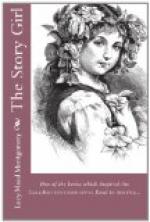“The fat one isn’t so bad. He isn’t so quick to move and get out of your sight while you’re winking as the thin one. But the only safe way to travel with those young ones would be to have ’em both tied to you with a short rope—a mighty short rope.”
“The fat one” was Felix, who was very sensitive about his plumpness. He was always taking exercises to make him thin, with the dismal result that he became fatter all the time. He vowed that he didn’t care; but he did care terribly, and he glowered at Mrs. MacLaren in a most undutiful fashion. He had never liked her since the day she had told him he would soon be as broad as he was long.
For my own part, I was rather sorry to see her going; and she cried over us and wished us well; but we had forgotten all about her by the time we reached the open country, driving along, one on either side of Uncle Alec, whom we loved from the moment we saw him. He was a small man, with thin, delicate features, close-clipped gray beard, and large, tired, blue eyes—father’s eyes over again. We knew that Uncle Alec was fond of children and was heart-glad to welcome “Alan’s boys.” We felt at home with him, and were not afraid to ask him questions on any subject that came uppermost in our minds. We became very good friends with him on that twenty-four mile drive.
Much to our disappointment it was dark when we reached Carlisle—too dark to see anything very distinctly, as we drove up the lane of the old King homestead on the hill. Behind us a young moon was hanging over southwestern meadows of spring-time peace, but all about us were the soft, moist shadows of a May night. We peered eagerly through the gloom.
“There’s the big willow, Bev,” whispered Felix excitedly, as we turned in at the gate.
There it was, in truth—the tree Grandfather King had planted when he returned one evening from ploughing in the brook field and stuck the willow switch he had used all day in the soft soil by the gate.
It had taken root and grown; our father and our uncles and aunts had played in its shadow; and now it was a massive thing, with a huge girth of trunk and great spreading boughs, each of them as large as a tree in itself.
“I’m going to climb it to-morrow,” I said joyfully.
Off to the right was a dim, branching place which we knew was the orchard; and on our left, among sibilant spruces and firs, was the old, whitewashed house—from which presently a light gleamed through an open door, and Aunt Janet, a big, bustling, sonsy woman, with full-blown peony cheeks, came to welcome us.
Soon after we were at supper in the kitchen, with its low, dark, raftered ceiling from which substantial hams and flitches of bacon were hanging. Everything was just as father had described it. We felt that we had come home, leaving exile behind us.
Felicity, Cecily, and Dan were sitting opposite us, staring at us when they thought we would be too busy eating to see them. We tried to stare at them when they were eating; and as a result we were always catching each other at it and feeling cheap and embarrassed.




